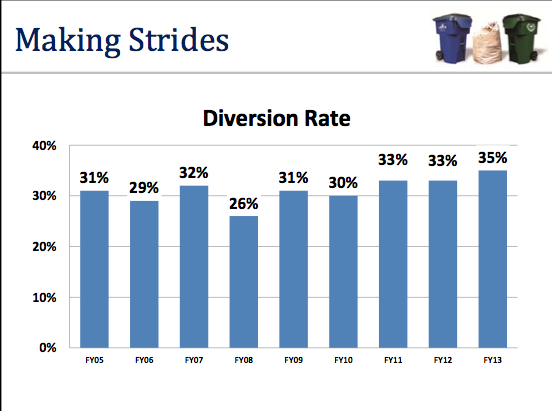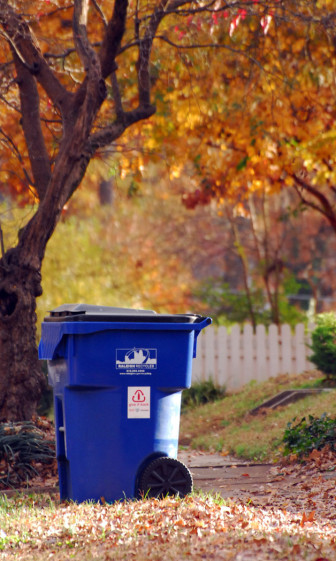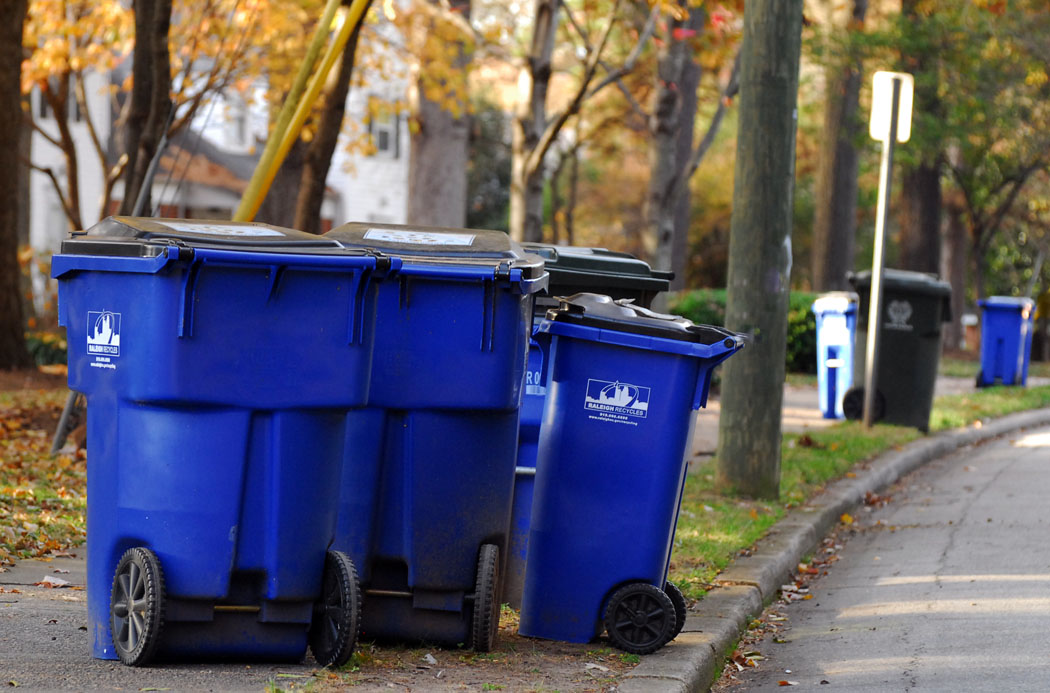Raleigh City Councilors want to increase recycling, but many of the suggested options have a massive operating impact on the Solid Waste Services Department.
The city’s recycling rate has increased 25 percent in the past five years, and Solid Waste staff and Councilors are exploring ways to continue to that trend. Options include recycling incentive programs, mandatory recycling laws and switching to a pay-as-you-throw program. Some options would result in increased revenue for the department, but all would have some sort of operating impact.
Raleigh provides trash and recycling collection services for single-family homes and some multifamily communities. Commercial properties and large multifamily communities use private vendors to haul away garbage.
Solid Waste Services Director Fred Battle told members of the Budget and Economic Development Committee Tuesday that the goal is to get the city’s diversion rate up to 50 percent. It’s currently 35 percent.

The diversion rate is how much trash is diverted from landfills to recycling. Committee members pointed out that less trash headed to the landfills will likely result in an increase in tipping fees, but the life of the landfill would be longer.
Battle said whatever the plan city chooses will have impacts throughout the city and Wake County.
“It needs to be well thought out and implemented,” he said.
Councilor Bonner Gaylord, speaking as a guest at the meeting, said that with two children in diapers, his family possibly creates more garbage than a senior citizen who lives alone and generates only one bag a week.

Karen Tam / Raleigh Public Record
“From my perspective, I’m underpaying,” he said.
Gaylord asked that the committee look for an option that is more fair than the system that is currently in place.
Councilor and committee member Eugene Weeks echoed those statements and asked that the recommendation take financial hardship into consideration.
“It’s already a hardship now,” he said.
Staff presented a number of possible options, but wanted more time to do research and collect data before making a solid recommendation.
Radio Frequency Identification (RFID)
Raleigh’s recycling bins are already fitted with RFID chips, but the equipment required to read the chips still needs to be installed on Raleigh’s garbage trucks. The chip would be used to collect data on the recycling program’s participation rates.
“The technology allows us to measure what’s out there,” Battle said. “If you don’t have the data it’s harder to manage.”
Recycling Incentives
The RFID data could be used to offer recycling rebates or rewards for residents that are recycling regularly. Battle said that these programs would wash out any increased revenue gained from more people participating.
Mandatory Recycling
RFID data could also be used to fine people who aren’t recycling if Councilors were to implement mandatory recycling rules. Battle said that Austin, Texas requires recycling for all commercial properties and multifamily communities with more than 50 units. Making recycling mandatory would require an increase in enforcement.
Increased Funding for Marketing
The city currently spends 46 cents per household for education, outreach and marketing, but the Solid Waste Association of North America recommends spending $1 per household. It’s unknown how much additional revenue the city would bring in by increasing its marketing, but it would cost the department $120,000 to $180,000 each year.
Offer Dumpster Service to Multifamily Communities
Large multifamily communities need private companies to haul away trash because the city doesn’t currently offer Dumpster service. The city does, however, provide recycling igloos to communities that want them. There are 649 communities already participating in the recycling program. The city could switch out the igloos for Dumpsters to woo the 149 communities that are not participating in the program.
Curbside Food Waste Collection
Because food waste comprises 15 percent of a landfill in 2001, staff also suggested curbside pickup of food waste, but there could be a substantial impact to the Solid Waste Services department. The city would need to purchase specialized trucks and additional carts, as well as make changes to the city’s yard waste center, including how it’s permitted.
Pay As You Throw
Battle said that cities that implement Pay-as-You-Throw programs typically experience an increase in recycling and a decrease in the amount of garbage going to landfills. The city could use special bags, provide customers with different cart-size options, or a hybrid of both. Those with larger carts pay more than those with smaller. While this method is starting to gain popularity, Battle noted that there are some difficulties keeping an appropriate inventory of carts, an increase in illegal dumping and the possibility of imposing a financial hardship for some residents.
